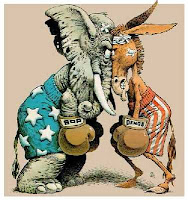
After reading Paul Sham’s post on the internet’s role in shaping democracy, and after writing/ranting about Holocaust deniers and woman-haters, I’m now left wondering about “freedom of speech.”
For one, is there a difference between “free speech” and “hate speech”? In his post Paul questions the ability of the web to democratize since it usually turns into an I’m-right-and-you’re-wrong competition, complete with insults and threats.
At this point, I would have to say that the right to “Freedom of Speech” is an illusion. Sure, we can all say what we want to say; it’s not like we’re all walking around with duct tape over our mouths…well, not literally. But if we say things that will offend or hurt another person/group of people, we’re suddenly not free anymore, and the metaphorical duct tape is firmly put in place. The internet is making this freedom more real, yes, but the speaker is always susceptible to responses/threats/name-calling from their angry critics.
The internet is making this freedom more real, yes, but the speaker is always susceptible to responses/threats/name-calling from their angry critics.
Take, for example, Bishop Richard Williamson, who claims that Jews made up the Holocaust. Obviously his comments upset a lot of people, but could we really believe we’re living in a democracy is he couldn’t express himself?
And in the same respect, should the people who think he’s an anti-Semite who needs to do some research not be allowed to say he’s an anti-Semite who needs to do some research?
It’s a very sticky issue, and no matter what is said it seems someone will always be hurt, offended, or disgusted by it. For example, I am pro-choice. Oops, I just pissed off a bunch of people!
I'm not trying to be rude, but here’s why I don’t care:
"Maintenance of a system of free expression is necessary:
- as assuring individual self-fulfillment
- as a means of attaining the truth
- as a method of securing participation by the members of the society in social, including political, decision-making
- as maintaining the balance between stability and change in society”
(from U of Ottawa)

Without disparate voices speaking out, women might not be “legal persons,” a black man might not be the President of the United States, this freedom to speak out might not even exist. Then where would we be?



I really would stay with the standard philosophy that speech is free so long as it isn't used to hinder someone else's freedom. When it comes to political debate, I think there is more freedom granted than in other areas.
ReplyDeleteWhile it is a thin line to have such a qualification of 'free' speech, there would be more problems if it was a free-for-all. Regardless, I don't think self-censorship has to do with fear of that free-speech consideration so much as how children are taught now. Political correctness is valid in some cases, but is often just silliness.